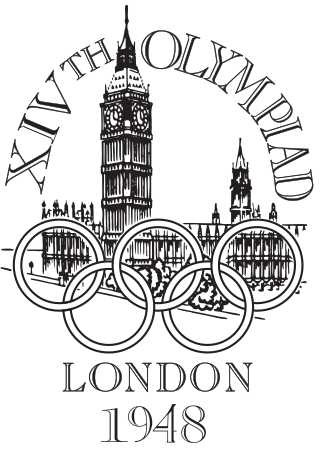
The Summer Olympic Games, also known as the Games of the Olympiad, and often referred to as the Summer Olympics, is a major international multi-sport event normally held once every four years on leap years. The inaugural Games took place in 1896 in Athens, Greece, and the most recent Games were held in 2021 in Tokyo, Japan. The International Olympic Committee (IOC) is responsible for organising the Games and for overseeing the host city's preparations. The tradition of awarding medals began in 1904; in each Olympic event, gold medals are awarded for first place, silver medals for second place, and bronze medals for third place.
The Winter Olympic Games were created out of the success of the Summer Olympic Games, which are regarded as the largest and most prestigious multi-sport international event in the world.

The 1948 Summer Olympics were an international multi-sport event held from 29 July to 14 August 1948 in London, United Kingdom. Following a twelve-year hiatus caused by the outbreak of World War II, these were the first Summer Olympics held since the 1936 Games in Berlin. The 1940 Olympic Games had been scheduled for Tokyo and then for Helsinki, while the 1944 Olympic Games had been provisionally planned for London. This was the second time London hosted the Olympic Games, having previously hosted them in 1908, forty years earlier. The Olympics would return again to London 64 years later in 2012, making London the first city to host the games thrice, and the only such city until Paris and Los Angeles host their third games in 2024 and 2028, respectively. The 1948 Olympic Games were also the first of two summer Games held under the IOC presidency of Sigfrid Edström.

The 1908 Summer Olympics were an international multi-sport event held in London, England, United Kingdom, from 27 April to 31 October 1908. The 1908 Games were originally scheduled to be held in Rome, but were relocated on financial grounds following the violent eruption of Mount Vesuvius in 1906, which claimed over 100 lives; Rome eventually hosted the Games in 1960.

John James Shepherd was an English tug of war competitor who competed in the 1908 Summer Olympics, in the 1912 Summer Olympics, and in the 1920 Summer Olympics for Great Britain.

The United Kingdom has been represented at every modern Olympic Games, and as of the 2020 Summer Olympics is third in the all-time Summer Olympic medal table by both number of gold medals won and overall number of medals. London has hosted the Summer Olympic Games three times: in 1908, 1948, and 2012.

Great Britain, represented by the British Olympic Association (BOA), competed at the 1920 Summer Olympics in Antwerp, Belgium. 234 competitors, 218 men and 16 women, took part in 84 events in 21 sports. British athletes won fourteen gold medals and 43 medals overall, finishing third. It would be the last Olympic Games in which Irish athletes participated for Great Britain, after foundation of Irish Free State in 1922.

The United States competed at the 1920 Summer Olympics in Antwerp, Belgium. 288 competitors, 274 men and 14 women, took part in 113 events in 18 sports.

Frederick Harkness Humphreys was a British tug of war competitor and sport wrestler who competed in the 1908 Summer Olympics in London, in the 1912 Summer Olympics in Stockholm, and in the 1920 Summer Olympics in Antwerp. He was also a constable in the City of London Police, collar number 970, as were two of his brothers.
Edwin Archer Mills was a British tug of war competitor who competed in the 1908 Summer Olympics, in the 1912 Summer Olympics, and in the 1920 Summer Olympics.

Albert Ireton was a British tug of war competitor and boxer who competed in the 1908 Summer Olympics.

Walter Chaffe was a British tug of war competitor who competed in the 1908 Summer Olympics and in the 1912 Summer Olympics.

Joseph Dowler was a British tug of war competitor who competed in the 1908 Summer Olympics and in the 1912 Summer Olympics.
Mathias Hynes was a British tug of war competitor who competed in the 1912 Summer Olympics. In 1912 he won the silver medal as member of the British team City of London Police, though he was Irish.

Alexander Munro was a British strongman, wrestler, and tug of war competitor who competed in the latter sport in the 1908 Summer Olympics and in the 1912 Summer Olympics.
John Sewell was a Scottish tug of war competitor who competed for Great Britain and Ireland in the 1912 Summer Olympics and in the 1920 Summer Olympics.

Walter Baldry Tammas was a British tug of war competitor who competed in the 1908 Summer Olympics.
Frederick William Holmes was a British tug of war competitor who competed in the 1920 Summer Olympics. In 1920 he won the gold medal as member of the British team, which was entirely composed of City of London Police officers.
Harold "Harry" Joseph Stiff was an English tug of war competitor who debuted at the age of 38 in the 1920 Summer Olympics, and won the gold medal representing Great Britain, as part of the City of London Police. He later became a landowner of the Horse and Groom Public House, Cornish Hall End, close to Finchingfield, Essex.
Ernest Arthur Thorne was an English tug of war competitor who competed in the 1920 Summer Olympics representing Great Britain. In 1920 he won the gold medal as member of the British team, which was wholly composed of City of London Police officers.
George Walter Canning was a British tug of war competitor who competed in the 1920 Summer Olympics. In 1920 he won the gold medal as member of the British team. He was part of the City of London Police which he worked for until 1935.







